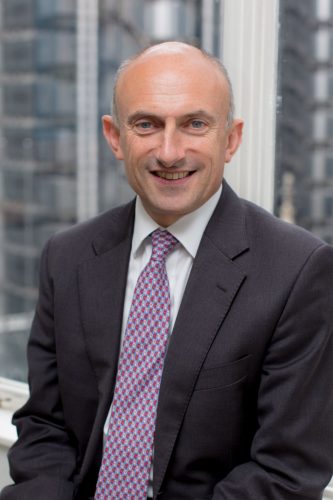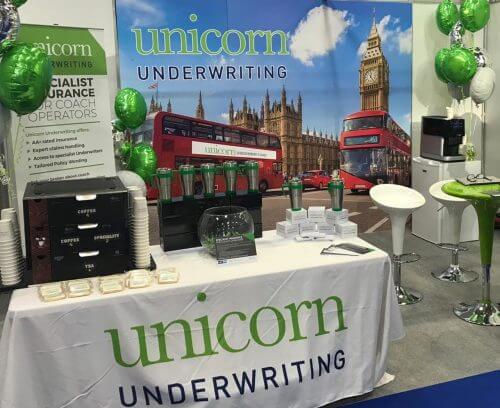 Julian Cashen of Unicorn Underwriting offers John Lewis an insight into how the company looks after operators the length and breadth of the UK
Julian Cashen of Unicorn Underwriting offers John Lewis an insight into how the company looks after operators the length and breadth of the UK
Speak up or you could lose out says Julian Cashen, Class Underwriter at prominent coach and bus insurance specialist, Unicorn Underwriting. “Coach and bus operators should report to their insurer as quickly as possible any incidents that are likely to lead to a claim against them,” he explained. “Failure to do so means that the size of the claim is likely to escalate and that could spell increased insurance premiums in the future.
“Fast notification is vital so that claims handlers can deal with the matter promptly,” he said. “Never forget that the third-party claims industry can swing into action very quickly and the activities of the credit hire sector remain a constant cause for concern.” [wlm_nonmember][…]
By subscribing you will benefit from:
- Operator & Supplier Profiles
- Face-to-Face Interviews
- Lastest News
- Test Drives and Reviews
- Legal Updates
- Route Focus
- Industry Insider Opinions
- Passenger Perspective
- Vehicle Launches
- and much more!
What this means is that if one of your drivers is unlucky enough to hit a car and damage it, then the car’s owner may end up being provided with a rental car by a credit hire company for weeks on end at your or your insurer’s expense. The damaged car may take a surprisingly long time to repair with parts apparently not available; and the rental car will keep racking up costs every day.
“Notify your own insurer’s claims handlers promptly and they can get in touch with the claimant directly and handle everything themselves to hold those costs in check,” advised Julian. 80% of the coach and bus claims Unicorn sees involve damage or injury to third parties, so keeping a tight grip on this area is vitally important.
Backed by Berkshire Hathaway International Insurance, Unicorn launched its specialist underwriting operation for fleet, haulage and passenger-carrying vehicles almost three years ago.
Julian and former Chief Executive Officer, Darren Nightingale, played leading roles in its establishment with the support of US-based global broker, AmWINS Group. They each have over 30 years of insurance industry experience, and Julian is well-known for his coach and bus expertise.
“50% of what Unicorn does involves passenger-carrying vehicles,” he said. “We’re the only insurers who are members of the Confederation of Passenger Transport.”
Unicorn has its own claims handling operation but also employs leading claims services provider Gallagher Bassett. It has arrangements with over 200 contracted repairers including 14 coach and bus specialists.
“The agreements Gallagher Bassett has in place definitely help contain repair costs and that’s good news for our clients running coach and bus operations,” confirmed Julian.
Bus companies in particular periodically face injury claims made by passengers and other road users that are at best dubious and at worst, completely false.
There is a view in the industry that insurers are not interested in defending such claims but Julian emphasised that is certainly not the case so far as Unicorn is concerned. It is prepared to stand up to fraudsters and will not automatically pay up if it believes a claim has no merit.
“Our interests are totally aligned with those of operators and we share their concern about the number of false claims that are made and the extent to which injuries are sometimes exaggerated,” he said. “We have seen some apparent ‘crash for cash’ incidents, and while it can be difficult to prove that an accident has been caused deliberately, we will always try to defend cases that we believe to be fraudulent.”
Genuine claims will always be honoured however, he stresses. “Our approach is to be firm but fair,” Julian said.
Unicorn sets out advice for drivers about what to do if there is an incident. “Stay calm, keep safe and call 999 if somebody is injured.
“Do not admit responsibility, but do take down details of what has happened including the date, time, location, traffic and weather conditions and the make, model and registration numbers of the vehicles involved. Take photographs using your smartphone too.
“Make a careful note of any injuries and damage to vehicles or property and get the contact details of other drivers along with those of any passengers and witnesses. Take down the details of any police officers who attend as well.”
Although it insures one or two major operators, Unicorn’s coach and bus client base is primarily made up of small to medium-size independent and often family-owned local firms. Coach companies dominate according to Julian. “They represent 80% to 90% of the business we do,” he observed.

They are for the most part involved in school contracts, private hire and UK tours, and these generate fewer claims than bus companies.
“With buses you see a high frequency of losses because they are constantly stopping and starting and passengers keep getting up and are at risk of falling over,” he explained.
Buses that are always on urban work in heavy traffic are at risk of coming into contact with other vehicles, not to mention wayward pedestrians and cyclists, and drivers are under understandable pressure to keep to schedule.
Insurance rates are rising at a rate of around 5% to 10% at present he says, although operators with a poor claims record going back several years are likely to pay significantly more than this on renewal.
Despite these increases, Julian asserts that insurance costs for coach and bus operators are proportionately lower than their other costs.
“If firms in the sector look back and see what they were paying for their insurance 20 years ago, then they will see that premiums have increased at a slower pace than all their other costs,” he said. “The reality is that they have not gone up by all that much over the past two decades and in our view the rate of increase should probably be closer to 10% to 20%.”
He appreciates that such a rise would not be welcomed by the industry. “Bear in mind though that the premium for a coach worth several hundred thousand pounds may only be £3,000, and of course the value of the vehicle is only one factor,” Julian added.
Coach firms tend to be conservative purchasers of insurance with no great desire to shoulder a greater proportion of the risk themselves, he notes. “The excess they are willing to accept is often only £250,” he said.
Taking a higher excess would not necessarily result in a significant reduction in premiums, so in this respect a conservative approach might be the right one. What can make a difference however is excluding windscreen cover, he says; especially if the firm concerned has made regular claims for damage that have resulted in umpteen screens being replaced.
“Operators like to have windscreen cover in place nevertheless,” he said.
The cover purchased by Unicorn’s clients is almost always comprehensive – something that is usually a must if the vehicle is on finance – although older coaches and buses tend to be insured against third party, fire and theft risks only.
Julian pointed out that coach and bus theft is thankfully rare, although minibuses get stolen occasionally. A more recent phenomenon however has been the increase in the number of claims arising as a consequence of vehicles spontaneously bursting into flames and ending up as charred wrecks.
“Arson is not the cause,” he stresses; the actual cause is not yet known.
“Fire investigators have sifted through the wreckage but have not been able to determine it,” he said. “The evidence has quite literally gone up in smoke.”
In the light of what has happened, Julian suggests that investing in on-board fire suppression systems could make a lot of sense.
He also welcomes the advent of better technology. “Advanced Emergency Braking System (AEBS) is a fabulous development for the insurance industry and should lessen the number of rear-end shunts,” he said.
He argues that insurers should embrace technology: “We sometimes make more of a fuss about new developments that we need to,” he commented.
Does that apply to vehicles powered by alternative fuels? “So far as insurance for electric buses and coaches is concerned, we have such little data that it is hard for us to say whether these vehicles represent a better or a worse risk than diesel vehicles,” he stated. “What we do know however is that no insurer is going to say; ‘we’ll either have to double the rate or not insure them at all’.”
Times change; and the insurance industry has to adapt accordingly.
[/wlm_ismember]

